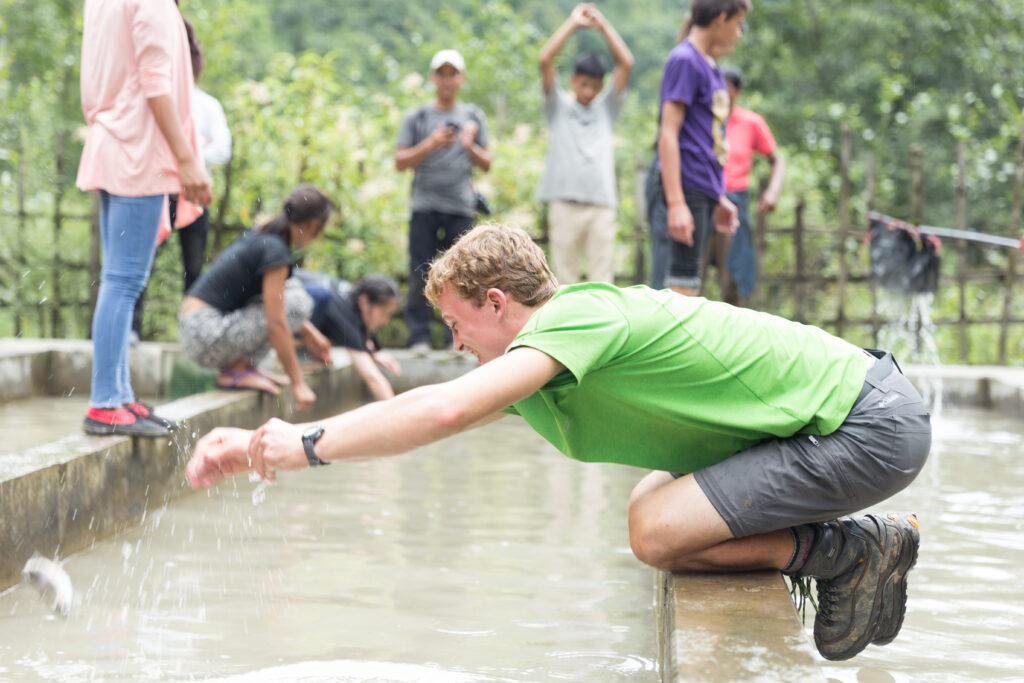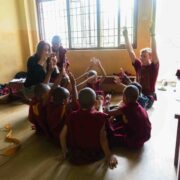Dylan Rodgers is an alumni student who participated in our Service Nepal program in 2018. Dylan is currently stationed in Nepal as a Fulbright scholar and reflects on his transformative summer program with Putney. In the interview below, read how his program shaped Dylan’s decision to pursue his academic career in Nepal.
What inspired you to apply for the Fulbright program and choose Nepal as your destination?
I applied for the Fulbright program because I believe in the program’s mission of facilitating cultural and scientific exchange between the U.S. and other countries. I chose Nepal because I had visited there twice already and wanted to continue and deepen my engagement. Luckily, a research institution was also interested in collaborating on a project I could contribute to.

Dylan gives a welcoming speech to the students at Shree Terse school in the village of Talamarang.
Photo: Kiki Baxter
Can you share some of your most memorable experiences or moments during your time in Nepal?
The people and environment make Nepal great. I have many memories with friends old and young, usually involving amazing food, which fill my heart just thinking about. I will never forget waking up almost every morning and seeing the Himalayas either! Surrounded by friendly people and natural beauty, every day here is memorable.
For your independent project (on your Service Nepal program), you made a flute out of bamboo from scratch. What inspired you to make the flute and do you still have it?
I still have the flute indeed! I have been learning some more tunes on it while I am here, and I think of the experience making it every time. I was inspired to make it because I never saw bamboo growing up, so seeing it here was fascinating. I played a few instruments growing up and I loved the Nepalese folk songs. I was amazed at how simple making the basuri (flute) was and how beautiful of a sound it produced.
How did your high school summer program in Nepal influence your decision to pursue further study or research in the country?/ In what ways do you believe your experiences in Nepal have shaped your personal and academic growth?
The summer program sparked the whole adventure which landed me back here today. After the program, I decided to apply to Cornell University, the only school which offers Nepali language, because I wanted to go back to Nepal. During college, my personal interest in Nepal developed into an academic interest as I learned about climate change, sustainable agriculture, and the intersection in Nepal. During the summer of Junior year, four years after the high school program, I spent two months researching small-scale agricultural tools near Pokhara and connected with a research institution which I am affiliated with for the Fulbright grant now. Through these experiences, and especially in the last eight months here, I have learned and grown so much personally and academically and could not be more grateful.
What specific research or projects did you undertake during your Fulbright scholarship in Nepal?
My project explores the feasibility of small-scale advanced aquaculture technology in Nepal. I built two above-ground, intensive fish farming systems which farmers might use to grow lots of fish with less land and water. After testing these systems, performing economic analyses, and conducting interviews with commercial farmers, I found that the advanced aquaculture technology which I tested is not feasible now, but may be in the future. I am now working with a class of 7th graders to build a small aquaponics system (fish and plants together) as a teaching tool!

Dylan attempts to catch a fish at a local fishery on his Service Nepal program in 2018.
Photo: Kiki Baxter
How did living and studying in Nepal impact your understanding of its culture, society, and traditions?
Living in Nepal, and working in Nepal too, is very different from just visiting for two weeks. I definitely experienced the culture more intimately, learning how to cook dal-bhaat (lentils and rice), how each holiday is celebrated, the ways work gets done, and the societal norms that shape people’s lives, particularly based on caste, education level, and gender. One thing that I didn’t know before was the extent to which Nepalese go abroad for opportunity and move to cities from villages. This is changing the culture a lot and globalization is very apparent.
Can you discuss any collaborations or connections you formed with local organizations or individuals during your Fulbright scholarship?
In terms of local connections, I am collaborating with a local Montessori school to offer a course on aquaponics (growing fish and plants together). This has been such a joy as they showcase their various singing and dancing talents! They seem invested in the project too as we build a small system together. I am affiliated with a national organization, the Nepal Agriculture Research Council.
How do you envision applying the knowledge and experiences gained from your time in Nepal to your future academic or professional endeavors?
I learned a lot about project management throughout the grant period which is broadly applicable. I am planning to work on various projects and grant-writing for a nonprofit in Puerto Rico next year. Although I learned a lot from this experience, I mostly realized how much I don’t know! It was a humbling experience which is encouraging me to seek mentorship and other experiences in the nonprofit world before committing to any particular academic or professional path.
Lastly, what advice would you give to other students considering a Putney summer in Nepal?
I would encourage students to be present and open while in Nepal. There are challenges for sure, but there is so much beauty in the people and environment. You can make connections and memories for life. I would also suggest lots of critical reflection during and after the program. Reflecting back on the trip and my positionality as a foreigner doing service in Nepal was very helpful in shaping my personal and professional engagement here, now and moving forward.

Dylan and fellow Service Nepal student, Abbey, play with young monk students at a monastery visit. Photo: Kiki Baxter







